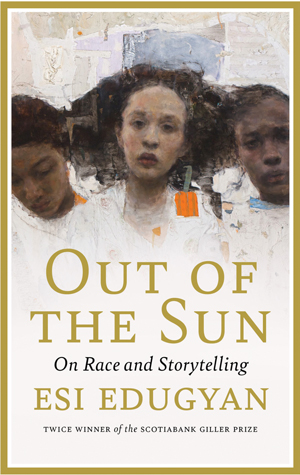Race is a country with slippery borders, impossible to contain or define, defying those who seek to map it out by receding maddeningly into obscurity the closer one gets. A fiction with terrifyingly real consequences, few subjects feel more urgent and yet more futile to write about. The only sure way to come at it is sideways, glimpsing it in the periphery.
This is Esi Edugyan’s approach in her Massey Lectures, which explore race and particularly Blackness through the liminal cultural spaces it inhabits: visual art, activism and stories both written and oral, to name a few. The two-time Giller Prize winner has explored the complexities of Black lives and histories before in works of fiction; with Out of the Sun, she takes a longer view that spans four continents and about 1,500 years of history (from the Tang dynasty in China, 618–907 AD—where contact between Asia and Africa is generally thought to have begun—to the outbreak of the COVID-19 pandemic, which raised the spectre of racism in ways many will find familiar).
Scrupulously researched though it is, Out of the Sun is an attempt to unpack concepts that are, by their very nature, in constant flux, and as such some material dates quickly. For instance, Edugyan notes that over the three weeks she spent editing her lecture on racial passing, two new stories broke that she would then need to revise the lecture to include.
This seems fitting, the medium echoing the message, as Edugyan’s lectures reveal the extent to which race is itself an enormous editorial undertaking. “A past of which you don’t speak can, in its silence, powerfully shape the present,” she writes, here referring to how the ghost stories we tell—and those we don’t—reveal the parts of our shared history we want to claim and those we’d rather forget. This lecture in particular, “Canada and the Art of Ghosts,” reverberates throughout the collection—not just because of Edugyan’s relationship to Canadian history, but also because over and over again she encounters her own ghosts. The lectures are laced with her family history and her complicated relationship with race, both in how it is imposed upon her and how it binds her to her past and loved ones.
Edugyan makes no apologies for places where her memory is unreliable or tinged with nostalgia, nor for the way she slips between past and present in each lecture; this too is fitting. To examine Blackness is to find that it is a mirage, a story that is always being written and rewritten at the same time. It’s to be expected that facts will collide with fantasies, the past with the present. If Edugyan is sometimes chasing shadows across continents only to find that the destination eludes her, the journey, at least, proves worthwhile.
Miranda Martini is a writer and musician in Calgary.


